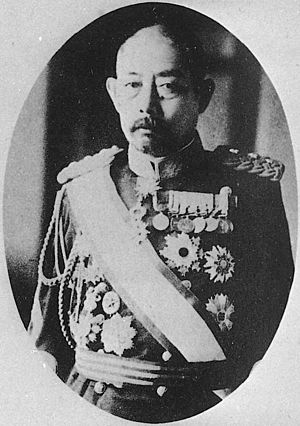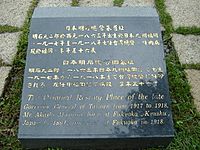Akashi Motojiro facts for kids
Quick facts for kids BaronAkashi Motojiro 明石 元二郎 |
|
|---|---|

Japanese General Akashi Motojirō
|
|
| Governor General of Taiwan | |
| In office 6 June 1918 – 24 October 1919 |
|
| Monarch | Taishō |
| Preceded by | Andō Teibi |
| Succeeded by | Den Kenjirō |
| Personal details | |
| Born | 1 September 1864 Fukuoka, Chikuzen Province, Japan |
| Died | 26 October 1919 (aged 55) Fukuoka, Japan |
| Military service | |
| Allegiance | Empire of Japan |
| Service/branch | |
| Years of service | 1889–1919 |
| Rank | |
| Battles/wars | First Sino-Japanese War Russo-Japanese War |
Baron Akashi Motojiro (明石 元二郎) was an important Japanese general. He was also the 7th Governor-General of Taiwan. He served from June 6, 1918, to October 26, 1919. Akashi was known for his intelligence work and for helping Taiwan grow.
Contents
Early Life and Military Career
Akashi Motojiro was born in Fukuoka, Japan. He graduated from the Imperial Japanese Army Academy in 1889. During the First Sino-Japanese War, he worked for General Kawakami Sōroku. His main job was to gather information. He traveled a lot in China and Taiwan for this work. After the war, he became a major.
Later, he observed the Spanish–American War in the Philippines. He was also in China during the Boxer Rebellion. He was promoted to lieutenant colonel around this time.
Spy Work During the Russo-Japanese War
At the end of 1900, Akashi was sent to Europe. He worked as a military expert, visiting many countries. He was part of the Japanese Secret Intelligence Services. Akashi created a large network of spies in European cities. He used trained agents and Japanese people living there.
Before the Russo-Japanese War, Akashi had a large budget. He used it to gather information on Russian military movements. He also supported groups who wanted changes in Russia. While in Russia, he reportedly recruited the famous spy Sidney Reilly. Reilly was sent to Port Arthur to gather information. After the war began, Akashi used his network to support groups trying to bring about change in Russia.
Akashi was also known for his talents as a poet and painter. He shared these interests with his friend, General Fukushima Yasumasa. These hobbies also helped him work with Sidney Reilly.
Akashi moved to Helsinki in late 1904 to avoid capture. He traveled widely across Europe. He helped provide money and support to various groups. These groups included those seeking independence in Finland and Poland. General Yamagata Aritomo told Emperor Meiji that Colonel Akashi was very valuable. He said Akashi was worth "more than 10 divisions of troops." Akashi was promoted to colonel at age 40.
Service in Korea
In 1905, Akashi was called back to Japan. He then joined the military forces in Korea. He became a major general and led the 14th Infantry Division.
After the war, he stayed in Korea. He worked with General Terauchi Masatake. There, he helped organize the military police. He was promoted to lieutenant general at age 49. In 1912, he received a special award for his work in Korea.
As Governor-General of Taiwan
In 1918, Akashi became a general. He was appointed Governor-General of Taiwan by Prime Minister Terauchi. He also received the title of danshaku, which means baron. During his time in Taiwan, Akashi worked hard to improve the country. He focused on its infrastructure and economy.
He is especially remembered for his projects to bring electricity to Taiwan. He created the Taiwan Power Company. He also planned the Sun Moon Lake hydroelectric power plant. This plant used water from a nearby river to create electricity.
Akashi's biggest contribution to Taiwan was the "Ka-Nan Irrigation System." This system was very long, totaling about 16,000 miles (26,000 km). It cost a lot of money, more than Taiwan's budget for a year. The Japanese government had to approve extra funds for this project.
Death and Burial
Akashi became ill and died a little over a year after taking office. He passed away while visiting his home in Fukuoka. He was the only Governor-General of Taiwan to die while in office.
In his will, Akashi wished to be buried in Taiwan. He wanted to "serve as a national guardian" for the people of Taiwan. Akashi was buried in a cemetery in Taihoku (modern-day Taipei City). He is the only Japanese Governor-General buried in Taiwan. The Taiwanese people donated money for a memorial and to support his family. This was because Akashi himself had not accumulated much wealth. His remains were later moved in 1999. They were re-buried at the Fuyin Mountain Christian Cemetery.
Akashi's exciting life has been the subject of many novels, manga, movies, and documentaries in Japan. He has been called the "Japanese James Bond" because of his spy adventures.
See also
- Taiwan under Japanese rule
Images for kids




